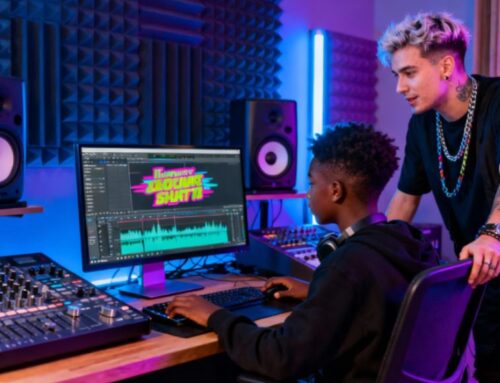Stage fright, also known as performance anxiety, is a common challenge for musicians of all levels. Whether you’re performing in front of a small audience or a packed concert hall, the fear of making mistakes can be overwhelming. However, with the right mindset and preparation, you can turn stage fright into confidence. In this article, we’ll explore practical tips to help musicians overcome stage fright and master their live performances.
Understanding Stage Fright
Stage fright stems from the body’s natural fight-or-flight response, triggered by stress and anxiety. Symptoms may include shaky hands, dry mouth, rapid heartbeat, and even mental blocks. While nervousness is normal, excessive anxiety can hinder performance. The key is learning how to manage these feelings so they don’t control you.
At Capstone Music in Burlington, we’re all about supporting both children and adults through anxiety and nerves and foster a love for learning music. Whether our students go on to perform or not, they build confidence in their abilities and supports their mental strength. Join us for music lessons today!
Preparation is Key
One of the most effective ways to combat stage fright is through thorough preparation. When you’re well-prepared, you feel more confident and in control.
1. Practice Regularly and Effectively
- Break down your performance into manageable sections and master them individually.
- Use a metronome to maintain steady timing and tempo.
- Simulate performance conditions by playing in front of friends or recording yourself.
- Focus on problem areas and refine your technique.
2. Know Your Setlist Inside Out
- Memorize your music to reduce dependence on sheet music or cues.
- Practice transitions between pieces to ensure smooth flow.
- Run through your entire performance multiple times to build endurance.
Mental and Emotional Strategies
Overcoming stage fright requires mental resilience and emotional control. Here are some psychological techniques to ease performance anxiety.
3. Visualize Success
- Close your eyes and imagine yourself performing confidently on stage.
- Picture a positive audience reaction and a flawless execution.
- This mental rehearsal primes your brain for success.
4. Breathing Techniques
- Practice deep breathing exercises to calm your nervous system.
- Inhale deeply through your nose for four seconds, hold for four seconds, and exhale slowly for four seconds.
- Controlled breathing reduces physical symptoms of anxiety.
5. Adopt a Positive Mindset
- Shift your focus from fear to excitement—nervous energy can enhance performance when channeled positively.
- Avoid negative self-talk and replace it with affirmations like, “I am prepared and capable.”
Performance Techniques
In addition to preparation and mental strategies, applying specific performance techniques can help you stay grounded on stage.
6. Start with a Warm-Up Performance
- Begin with a short, simple piece to ease into the performance.
- This helps build momentum and confidence before tackling more challenging sections.
7. Engage with the Audience
- Make eye contact and smile to create a connection with listeners.
- Focus on expressing the music rather than worrying about judgment.
8. Use Body Language to Your Advantage
- Maintain good posture and avoid unnecessary fidgeting.
- Confident body language helps reinforce a sense of control.
Coping with Mistakes
Even the most seasoned musicians make mistakes. The key is learning how to recover gracefully.
9. Keep Going No Matter What
- If you hit a wrong note, move on without drawing attention to it.
- Most audience members won’t notice minor mistakes unless you react to them.
10. Have a Backup Plan
- If memory slips occur, have a quick reference point to regain your place.
- Develop strategies like improvisation or transitioning smoothly to the next section.
Long-Term Confidence Building
Overcoming stage fright is an ongoing process. Implementing long-term strategies can help you become a more confident performer.
11. Perform Regularly
- The more often you perform, the more comfortable you’ll become.
- Look for local open mic nights, recitals, or casual performances to gain experience.
12. Seek Constructive Feedback
- Record your performances and analyze areas for improvement.
- Work with a music coach or mentor to refine your stage presence.
13. Take Care of Your Well-Being
- Maintain a healthy lifestyle with proper sleep, nutrition, and exercise.
- Stress management techniques like yoga or meditation can help reduce anxiety overall.
Overcoming Nerves and Finding Confidence
Stage fright is a challenge that can be overcome with preparation, mental resilience, and practical strategies. By practicing regularly, adopting a positive mindset, and gaining performance experience, you can transform nervous energy into confidence. Remember, every great musician has faced stage fright—what sets successful performers apart is their ability to manage it. Keep pushing yourself, and soon, performing on stage will feel like second nature.






